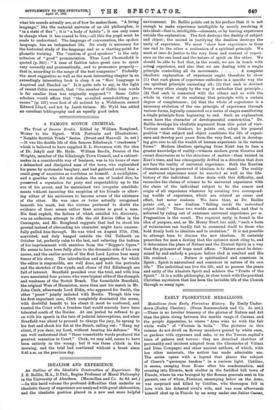IDEALISM AND EXPERIENCE. environment. Dr. Bernie points out in his
preface that it is not enough to make experience intelligible by merely resolving it into ideal—that is, intelligible—elements, or by leaving experience outside the explanation. The first destroys the duality of subject and object ; the second in justifying the dualism destroys the unity of experience. We must "show how experience is from one end to the other a realisation of a spiritual principle. We must at once do justice to the very form and content of experi- ence on the one hand and the hature of spirit on the other. We should be able to feel that, in the result, we are in touch with actuAl experience, and also that we are dealing with a single
principle controlling all its movements A complete idealistic explanation of experience ought therefore to show (1) that each phase of experience embodies in a specific way the one spiritual principle animating all; (2) that each is distinct from every other simply by the way it embodies that principle ; (3) that each is connected with the others and so with the whole in virtue of its realising that principle with a certain degree of completeness ; (4) that the whole of experience is a necessary evolution of the one principle of experience through various forms, logically connected as a series of stages manifesting a single principle from beginning to end. Such an explanation must have the character of developmental construction." Dr. Baillie develops his idealistic argument from this point of view. Various modern thinkers, he points out, adopt his general position "that subject and object constitute the life of experi- ence and develop pari passe from the very first, and in develop- ing give rise to all the wealth of human experience in its various forms." Modern idealism springing from Kant has to face a greater knowledge of reality—witness modern germ theories and recent discoveries as to the structure of matter—than existed in Kant's time, and has consequently drifted in a direction that does not face the reality of universal experience. Both the Kantian elements must be preserved if idealism is to stand. The reality of universal experience must be assorted as well as the life- history of the individual. Lotze deals with this difficulty, and reconciles the claims of science to be universal experience with the claim of the individual subject to be the source and origin of all experience whatever by creating two correspond- ing worlds of experience, which are related as cause and effect, but never coalesce. We have thus, as Dr. Baillie points out, a new dualism " falling inside the individual subject itself." These two worlds must be unified, and that is achieved by ruling out of existence universal experience per se. Pragmatism is the result. The required .unity is found in the idea of purpose, and, as Mr. Henry Stunt has said, "such a form of voluntarism can hardly fail to commend itself to those who hold firmly both to idealism and to evolution." It is not possible to attempt here to discuss the new idealism. It certainly prescribes for man a destiny that the optimist must cling to, and it determines the place of Nature and the Eternal Spirit in a way that the prisoners of hope must affirm. "Nature must be deter- mined by and embody a purpose before God is reached and His
life realised Nature is spiritualised and conscious in Spirit ; Spirit is naturalised and conscious in nature of its own life." The individual can live the life, and so possess the peace and unity of the Absolute Spirit and achieve the '• Fruits of the Spirit." It is a noble philosophy, in close touch with the practical Christian mysticism that has been the invisible life of the Church through so many ages.


























































 Previous page
Previous page